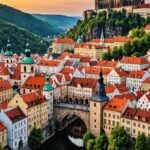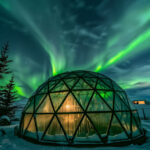Bora Bora, French Polynesia: Paradise on Earth
History of Bora Bora
Bora Bora, often called the “Pearl of the Pacific,” is an island in French Polynesia, located in the South Pacific. It has been inhabited since the 4th century by Polynesians. The island’s name comes from the Tahitian phrase “Pora Pora,” meaning “First Born.”
In 1722, Dutch explorer Jakob Roggeveen became the first European to discover Bora Bora, followed by Captain James Cook in the 18th century. During World War II, the United States established a military base on the island, which played a crucial role in its development. Today, Bora Bora is synonymous with luxury, romance, and natural beauty, attracting visitors from around the world.
Daily Life
Daily life in Bora Bora is deeply connected to its natural environment. Locals, known as Polynesians, live a relaxed lifestyle influenced by their traditions and the rhythm of the sea. Fishing, farming, and tourism are the primary sources of livelihood.
Residents enjoy community gatherings, traditional dances, and local cuisine featuring fresh seafood, coconut, and tropical fruits. For visitors, activities range from snorkeling and scuba diving to hiking and exploring cultural sites.
Impact on Daily Life Globally
It is a dream destination for many, symbolizing the ultimate tropical paradise. It inspires travelers worldwide to appreciate the beauty of nature and Polynesian culture. Its luxurious overwater bungalows have set a benchmark for hospitality, influencing the global tourism industry.
The island also emphasizes the importance of sustainability. Efforts to protect its coral reefs and marine life serve as a reminder of the need for environmental conservation.
Fascinating Facts
- Volcanic Origins: Bora Bora was formed by a volcanic eruption over 7 million years ago.
- Natural Lagoon: Its lagoon is one of the most beautiful in the world, surrounded by a barrier reef.
- Marine Biodiversity: The island is home to diverse marine life, including manta rays, sharks, and colorful coral gardens.
- Population: Only about 10,000 people live on Bora Bora, adding to its exclusive charm.
- Overwater Bungalows: The concept originated in French Polynesia and has become a global symbol of luxury.
Significance
It represents the perfect blend of natural beauty, culture, and tranquility. It’s a haven for those seeking relaxation and adventure, offering unparalleled experiences like swimming with rays or enjoying a traditional Tahitian feast. The island’s cultural heritage and environmental significance make it a treasure worth preserving.
Observance and Celebrations
It’s cultural celebrations include:
- Heiva Festival: A month-long event featuring traditional dances, music, and sports.
- Tattoo Art Tradition: Tattoos hold spiritual and cultural importance in Polynesian society.
- Community Feasts: Celebrations often involve shared meals and storytelling.
Important Points to Remember
- Respect the Environment: Protecting Bora Bora’s delicate ecosystem is essential.
- Cultural Etiquette: Learning about and respecting Polynesian customs enriches the experience.
- Sustainability: Choose eco-friendly accommodations and tours to minimize environmental impact.
- Connectivity: While remote, Bora Bora offers modern amenities and connectivity.
FAQs
1. Is expensive to visit? Yes, It is a luxury destination, but travelers can find budget-friendly options by planning ahead.
2. What is the best time to visit? April to November is ideal for dry weather and clear skies.
3. Do I need a visa to visit? Visitors from many countries can enter French Polynesia visa-free for up to 90 days.
4. Are there unique activities? Yes, activities include lagoon tours, shark feeding, and exploring ancient Polynesian temples.
Wishing a Sustainable Future
It’s unparalleled beauty and cultural richness make it a destination that leaves a lasting impression. As we admire its pristine beaches and vibrant marine life, we must also contribute to its preservation. Supporting sustainable tourism ensures that this paradise remains untouched for generations.
Why is Important to Society
It symbolizes the harmony between humanity and nature. It reminds us of the need to cherish and protect our planet’s most beautiful places. The island’s cultural traditions and environmental initiatives inspire global efforts toward sustainability and heritage preservation.










